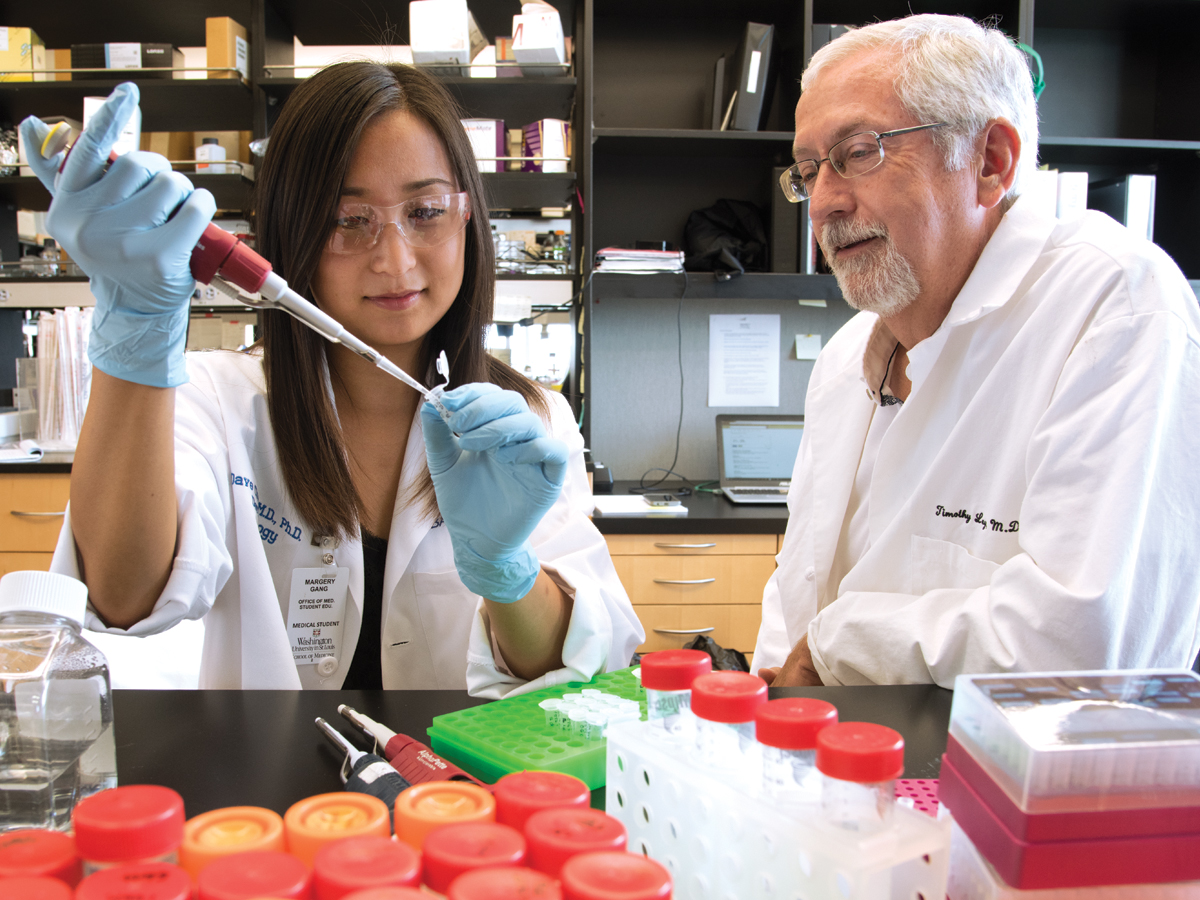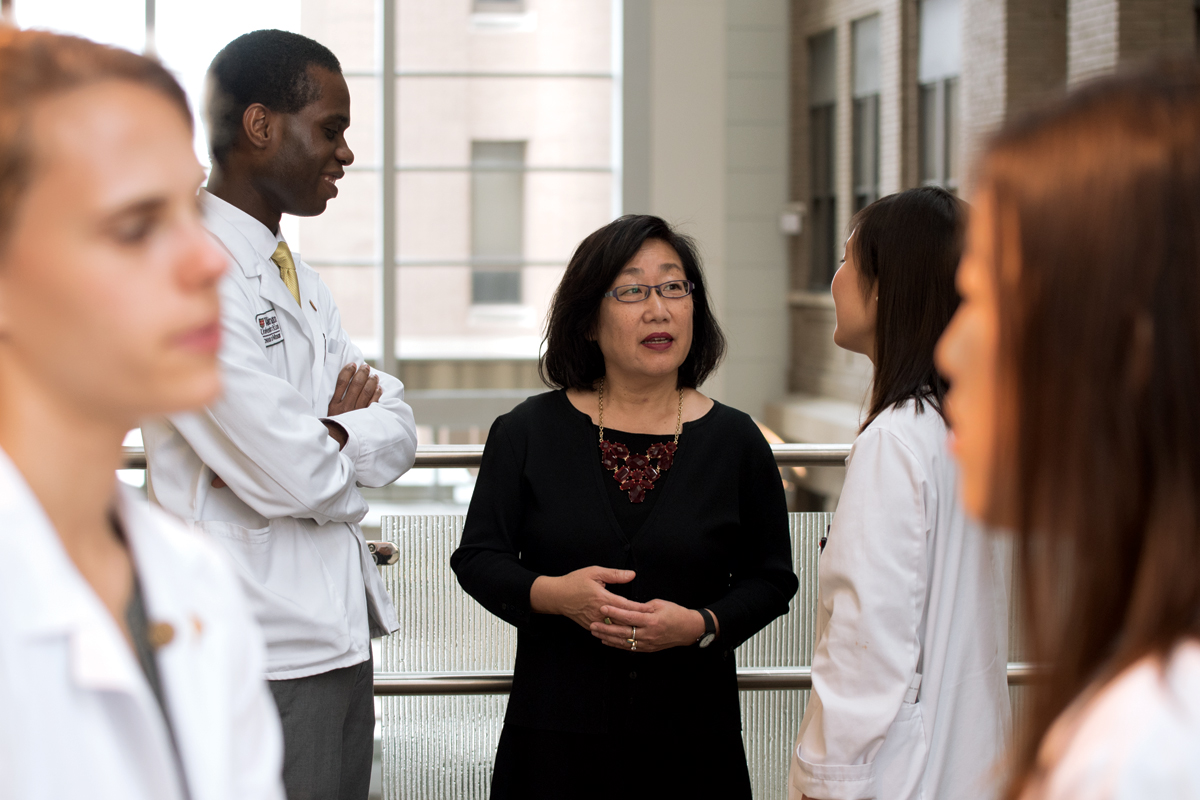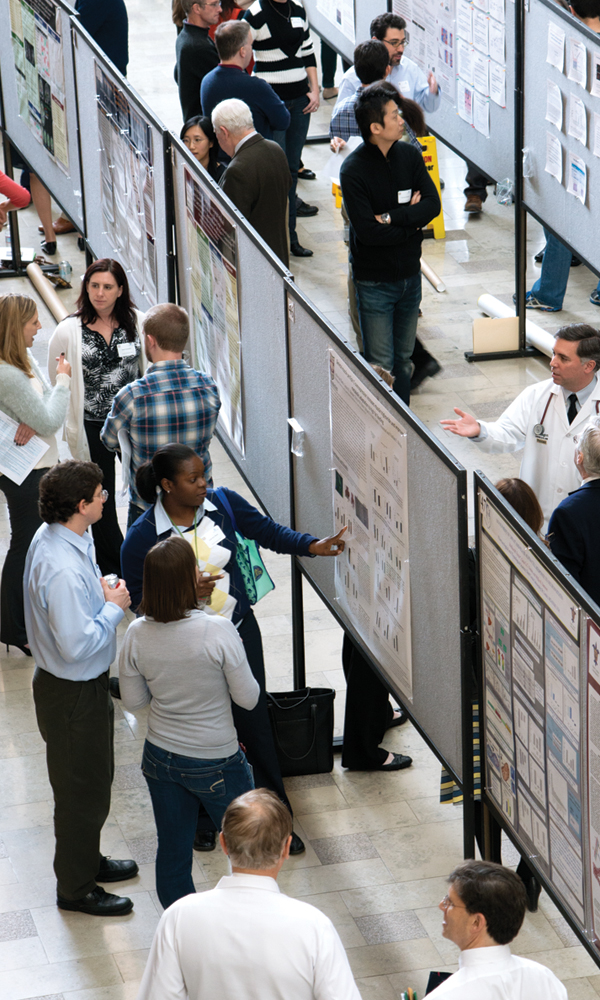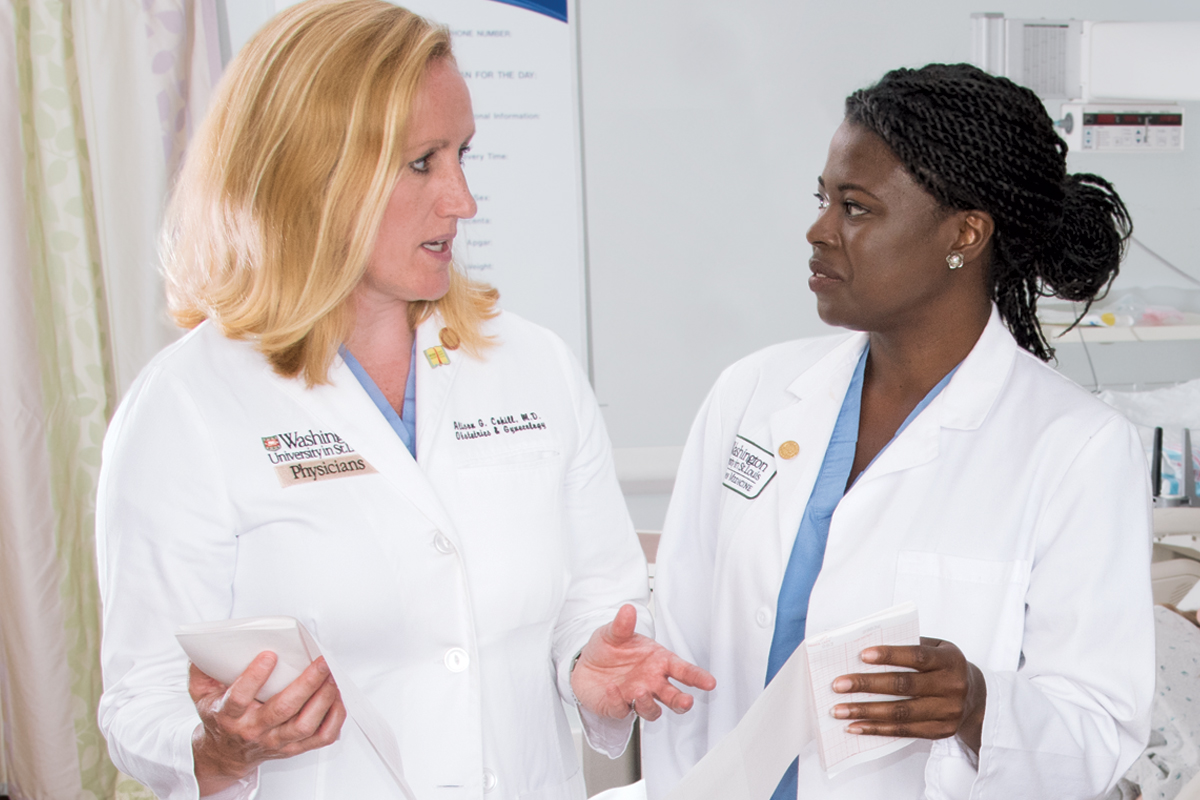
On top of mastering enormous volumes of material, sitting for exams, going through clinical rotations and applying for residencies, medical students don’t have a lot of spare time.
Yet health-care professionals recognize the importance of research experience, even for students headed into clinical practice. Strong research skills and strong clinical skills are inextricably linked.
Doctors must scrutinize an endless barrage of primary scientific literature; only by thinking critically can they determine the best course for individual patients.
At the School of Medicine, student research opportunities abound — in basic, clinical and translational science, global health, device and technology development, and in nearly every discipline. More than 2,100 faculty mentors stand ready to guide.
Orchestrating the dizzying array of options and playing master project matchmaker between student and faculty mentor is Koong-Nah Chung, PhD, associate dean for medical student research.

An upswing in involvement
Although involvement is optional, more than 95 percent of students complete a research project during their time at the medical school.
“Research is an essential part of the MD curriculum,” said Michael M. Awad, MD, PhD, associate dean for medical student education and associate professor of surgery. “Here, they gain the ability to perform scientific discovery and begin a journey of lifelong learning, priming them to become future leaders in academic medicine.
“Very few schools with optional research programs have such a high student participation rate, a fact noted positively during our recent medical school accreditation site visit,” he added.
The school’s robust research environment plays a key role in recruiting and molding students. Via in-house surveys, applicants cite “research opportunities” as one of the top two reasons for selecting Washington University.
In surveys of U.S. medical students conducted by the Association of American Medical Colleges, Washington University respondents say they incorporate research into their studies at double the national rate. Further, they publish at twice the national rate. Sixty percent of Washington University medical graduates lands careers at academic medical centers versus 30 percent nationally. “We truly are training future physician-scientists,” Chung said.
‘We truly are training future physician-scientists.’
— Koong-Nah Chung, PhD
Fifteen years ago, just one-third of Washington University medical students participated in research, supported at the time by a small National Institutes of Health (NIH) grant. There wasn’t a dean of student research or a centralized office to coordinate project partnerships.
Chung — who was appointed research assistant professor in 1996 and assistant dean in 1999 — became that point person and began advocating for increased participation. Five years ago, she formed the Office of Medical Student Research.
Chung and her team members, including coordinator Rosalyn Bradshaw-Robinson, and administrative assistant Heather Bartels, work tirelessly to create an infrastructure that spawns hundreds of research projects. To-dos include: soliciting funding; tracking the work of 2,000-plus principal investigators; and meeting one-on-one with students. The office maintains comprehensive listings of trainees over the last 20 years and their funding sources and published works.
“She (Chung) is such a researcher at heart,” Bradshaw-Robinson said. “She attacks everything with such attention and detail.”
Thomas Baranski, MD, PhD, associate professor of medicine, agrees. “Dean Chung has been essential in fostering research opportunities for medical students. She has succeeded because of her own love of medical research and her passion to see our medical students get a chance to do their own research.”
In today’s competitive funding environment, only 7 percent of NIH grant submissions receive approval. However, Chung’s initial five-year NIH grant from 2001 has been renewed four times, cumulatively bringing in $3 million for student research. As a result, every student participating in a summer research project has been fully funded for the past 16 years through this grant and financial support from the dean’s office.
This spring, Chung learned that the grant has been extended through 2021. The 1,200-page NIH grant application, which requires nine months of preparation, received a nearly perfect score.
Lengthier research projects are not fully covered, but Chung’s team leverages 20-plus funding mechanisms — including various foundations and private grants — and guides students in writing applications for financial support.

For Chung, it all comes down to customer service. Seamless experiences for mentee and mentor boost participation and enrich the institution. “Definitely the word has gotten out,” Chung said. “Any medical student who wants to participate can. That commitment is loud and clear to students. If you want to do research, we make it easy here and you can do significant research.”
To get the process started, Chung and Robinson meet personally with students. Because Chung also serves as admissions subcommittee chair, her mornings, October through February, are reserved for meeting prospective students. Her afternoons are spent helping current students better understand their interests as they seek meaningful projects.
As someone who knows all of the students and many of the faculty members, Chung strives to match temperaments. Finding an ideally suited mentor can forever alter a student’s life aspirations.
Rachel Goldberg, now a third-year medical student, met Chung during the admissions process and later sought her help in securing an otolaryngology research project. She echoes the thoughts of many students who describe Chung as one of the medical center’s most beloved members.
“Dean Chung is amazing,” Goldberg said. “She is one of the warmest people I know. She is what I thought about when I thought about Washington University. I don’t know anybody in the country who does what she does.”
For students on a hectic training path, this support makes all the difference. “When I was looking at medical schools, I didn’t hear of another medical school that was able to provide that amount of funding to students,” Goldberg said. “I didn’t have to worry about finding funding for research. It definitely was a draw. I just needed to concentrate on my education.”
Lasting contributions
Faculty here — including some of the world’s experts in their respective fields — are eager to welcome the 500 MD and nearly 600 PhD students. “Over the years, I’ve not had one faculty member who didn’t want to host,” Chung said. “We are successful because faculty are willing to mentor. I’ve also had support from Deans William Peck, Larry Shapiro and David Perlmutter and my mentors Ed Dodson and Leslie Kahl.”
For faculty, it’s inspirational to have smart, creative, hard-working students in their labs. “Our faculty are drawn here and retained here because of the ability to work with great students,” Chung said.
Jay F. Piccirillo, MD, FACS, recalls the outstanding mentorship he received during fellowship training at Yale University from Alvan Feinstein, the grandfather of clinical epidemiology. Today, Piccirillo, a professor of otolaryngology-head and neck surgery, enjoys serving a similar role in trainees’ lives and hopes to inspire them to become “change agents” in medicine.
Many of the mentor-mentee relationships evolve into decades-long collaborative partnerships.
“The most important part of being a mentor is listening to mentees, supporting them through their situation, whether that is a research project or personal life challenge,” Piccirillo said. “Now that I have been at the medical center for more than 20 years and have interacted with so many students, I feel very confident that I have valuable information to share.
“I love to be available and help, when asked, for important decisions in our students’ lives, like specialty choice or whether to pursue an academic research career.”
Many such relationships evolve into decades-long collaborative partnerships. “The mentor has the reward of witnessing the intellectual growth and maturation of the mentee,” said Michael Avidan, MBBCh, professor of anesthesiology and cardiothoracic surgery. “It is particularly rewarding when my students have advanced in their careers, developed their own research programs, and have demonstrated prowess as independent investigators.
“I believe that the most important contribution we make to society as faculty members is the mentorship and guidance we provide to our students.”
Stereotypes persist of the lonely scientist toiling away in a lab, performing repetitive tasks and interacting only with pipettes and test tubes. It’s Chung’s goal to dispel such notions and help students through their initial hesitation and self-doubt. Research, she said, is connected with independent thinking, creativity, teamwork and, most importantly, discovery.

Redefining medical practice
Katherine Santosa admits she found the idea of research intimidating as a fledgling medical student. This all changed following a mentorship with Susan Mackinnon, MD, the Shoenberg Professor of Plastic and Reconstructive Surgery and chief of the Division of Plastic and Reconstructive Surgery.
“The decision to spend one year in the laboratory under Dr. Mackinnon has undoubtedly been one of the most important decisions I have made in my career,” Santosa said.
“Dr. Mackinnon is a brilliant surgeon-scientist who generated research questions directly based on the challenges she encountered in the clinic and operating room,” she added. “Then, she would take the data and translate the work from the laboratory back to her patients in the clinic. As a medical student, I witnessed the tremendous impact research could have on improving outcomes for surgical patients.”
Following a surgical residency at the University of Michigan, Santosa, MD, has returned to Washington University as a plastic surgery resident and research fellow under plastic surgeon Alison K. Snyder-Warwick, MD.
Now, Santosa has new aspirations: to care for patients with facial paralysis and complex peripheral nerve injuries, and to have a
laboratory that will improve understanding of neural regeneration.
Through research, abstract concepts taught in the classroom become less elusive. Students gain an appreciation for the vigor of research — how to create hypotheses and test them and to meticulously record their work. Perhaps, most dauntingly, they learn about failure.
“In science, it’s a natural thing to encounter failure; it’s normal to encounter failure nine out of 10 times,” said Brian Kim, MD, assistant professor of medicine and dermatology. “For many students, especially students at great institutions like Washington University — to their credit — they haven’t often encountered failure. It’s something all scientists have to tackle. I feel, as a PI, like much more of a coach than a teacher.
“It’s about having the right mentality and viewing science not as a sprint, but understanding that it’s a marathon and that we have to continuously put in the work,” he added.
Santosa said research quickly taught her humility and resilience. “Designing experiments, getting presentations and publications accepted, and obtaining grants are all essential components of the process but they are exceedingly difficult to do,” she said. “While caring for patients certainly teaches you similar lessons, I think failure in research is more common than it is in the clinics, and the only way to succeed is to persevere.”
As part of the program, students must explain and defend their work in a poster presentation. This fall, the research office will sponsor its 11th annual WUSM Research Symposium and Poster Session on campus. The event draws many inquiring minds from the medical center community. Students also are encouraged to travel and present at professional meetings.
Piccirillo said he was overjoyed to see the expression of personal pride and satisfaction on the face of one of his mentees — who suffered from social anxiety — after delivering a flawless research presentation at a national meeting.
According to Kathryn Diemer, MD, assistant dean for career counseling and associate professor of medicine, such polished, prepared Washington University students fare well in the fiercely competitive national residency match, earning coveted training spots. All of this leads to a generation of more knowledgeable, well-rounded physicians.
As Chung says, “When given the tools, our students can fly.”

Pathways to research
Washington University medical students conduct research through four options:
Summer Research Program, a three-month introduction to research
Yearlong Research Program, in which students “stop the medical school clock” and are released from courses to conduct one year of in-depth research after their second or third year of medical school. Tuition is waived, and many students receive stipends.
Fourth-year elective, offering six to 12 weeks of full-time, daily research for credit
Medical Scientist Training Program designed for physician-scientists who wish to earn a combined MD/PhD. The rigorous program takes six to eight years to complete; tuition is waived, and students receive an annual stipend.
Published in the Autumn 2016 issue


